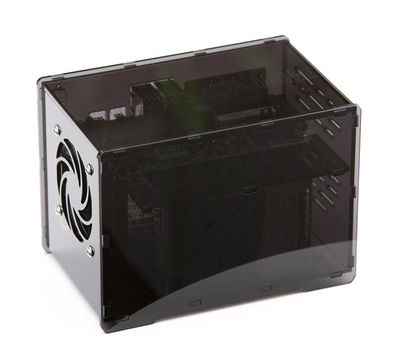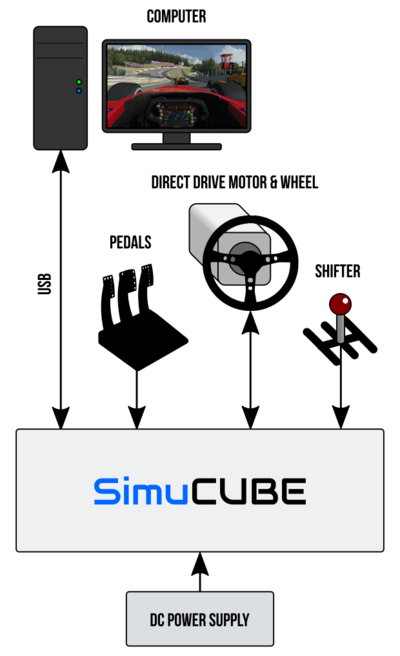SimuCUBE install guide
This is the guide to install and configure SimuCUBE based Force feedback system (FFB) from the factory state to a working state. This is for you if you have assembled SimuCUBE based system ready for use, or a system needing just motor wiring to the system.
If you have bare SimuCUBE mother board or SimuCUBE kit that needs assembly, see SimuCUBE documentation portal for earlier sections of the documentation.
Safety - read carefully
SimuCUBE based Force feedback system (FFB) pose high mechanical danger that may cause serious injuries to living beings, cause damage to external property or loss of profits. Always operate SimuCUBE based system with maximal caution.
|
Overview
The usage of SimuCUBE system involves connecting all necessary parts together and configuring software and parameters to work with the actual force feedback applications. This guide assumes that user already has necessary parts, including:
- A SimuCUBE control box (with integrated power supply)
- A servo motor to be used as force feedback actuator
- A steering wheel attached to a motor
- A PC computer with at least one USB 2.0 port and Microsoft Windows 7 or later Windows version
- Firmware and software to be installed to SimuCUBE and to configure it via PC.
- Wiring materials:
- 1 or 2 Mini-USB cables
- IEC C13 power cord (similar to most PC peripherals use)
- Motor cables: power cable (with bare wire ends) and motor feedback device (encoder) cable. If the feedback device cable does not come with SimuCUBE (or IONI or ARGON) compatible feedback device connector installed, then having a two row male D-Sub 15 connector, connector hood, and soldering tools are also necessary to make the cable.
Installation step-by-step
Installation procedure main steps are:
- PART 1: Connect motor to SimuCUBE. If motor does not come with SimuCUBE (or IONI or ARGON) compatible feedback device connector, then assembling a connector is also necessary.
- PART 2: Configuring the IONI drive to match the motor properties. This is not required if you are planning to use a configuration file from various sources around the Internet. However, this article has guidelines and settings that are required when using SimuCUBE with a servo motor in general, if a ready-made configuration file is not available.
- PART 3: Install the Force feedback firmware in the SimuCUBE. This is necessary as SimuCUBE ships without firmware for the time being.
- PART 4: Optional: wire pedals, buttons and other input devices to SimuCUBE
For common pitfalls and problems, see SimuCUBE troubleshooting.
In no event the Product Information or parts hereof shall be regarded as guarantee of conditions or characteristics. The Product Information or any part thereof may also not be regarded as a warranty of any kind. No liability of any kind shall be assumed by Author with respect to Product Information or any use made by you thereof, nor shall Author indemnify you against or be liable for any third party claims with respect to such information or any use thereof.
As content of this Wiki may be edited by user community, Granite Devices Oy or it's affiliates do not take any responsibility of the contents of this Wiki. Use information at your own risk. However, Granite Devices staff attempts to review all changes made to this Wiki and keep information trustworthy.
Without written consent, Granite Devices' Products or Intellectual Property shall not be used in situations or installations where living beings, material property, or immaterial property could be harmed by the operation, features or failures of Product. Products may only be used in a way where hazards like moving parts, electric shock, laser radiation, or fire can't be realized even if the content of this Wiki would suggest otherwise.

